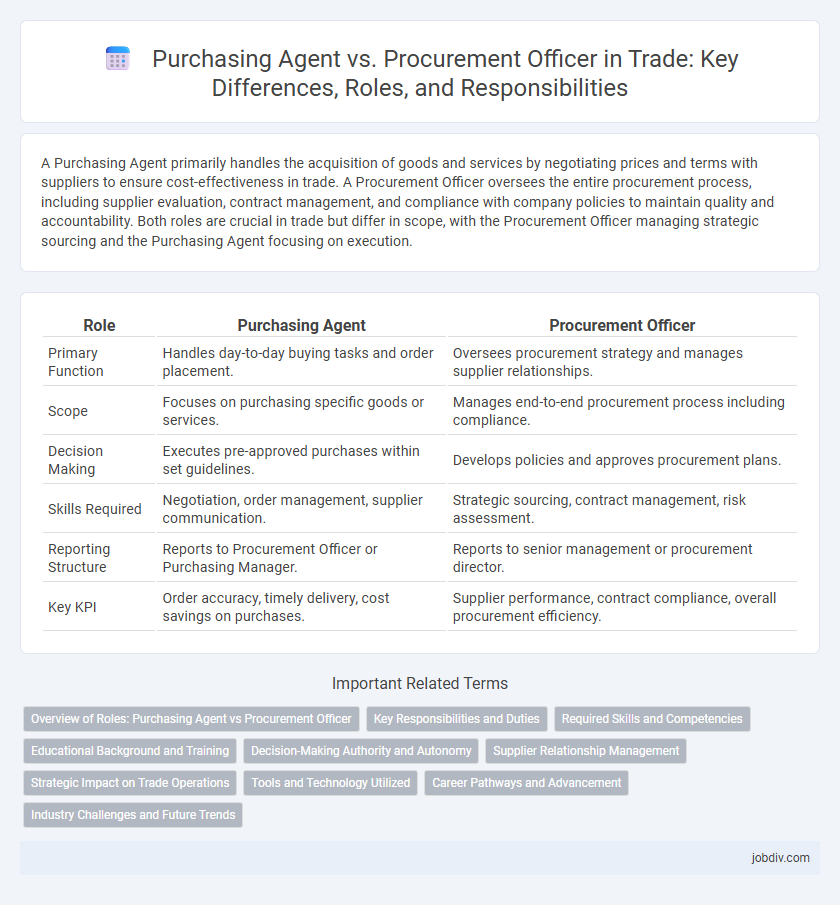A Purchasing Agent primarily handles the acquisition of goods and services by negotiating prices and terms with suppliers to ensure cost-effectiveness in trade. A Procurement Officer oversees the entire procurement process, including supplier evaluation, contract management, and compliance with company policies to maintain quality and accountability. Both roles are crucial in trade but differ in scope, with the Procurement Officer managing strategic sourcing and the Purchasing Agent focusing on execution.
Table of Comparison
| Role | Purchasing Agent | Procurement Officer |
|---|---|---|
| Primary Function | Handles day-to-day buying tasks and order placement. | Oversees procurement strategy and manages supplier relationships. |
| Scope | Focuses on purchasing specific goods or services. | Manages end-to-end procurement process including compliance. |
| Decision Making | Executes pre-approved purchases within set guidelines. | Develops policies and approves procurement plans. |
| Skills Required | Negotiation, order management, supplier communication. | Strategic sourcing, contract management, risk assessment. |
| Reporting Structure | Reports to Procurement Officer or Purchasing Manager. | Reports to senior management or procurement director. |
| Key KPI | Order accuracy, timely delivery, cost savings on purchases. | Supplier performance, contract compliance, overall procurement efficiency. |
Overview of Roles: Purchasing Agent vs Procurement Officer
A Purchasing Agent primarily focuses on acquiring goods and services by evaluating suppliers, negotiating prices, and processing purchase orders, ensuring cost-effective acquisition aligned with company needs. A Procurement Officer, meanwhile, oversees the entire procurement process, including strategic sourcing, vendor relationship management, contract negotiation, and compliance with organizational policies. Both roles are critical in the supply chain, but the Procurement Officer typically holds a broader responsibility that includes policy enforcement and long-term procurement strategy.
Key Responsibilities and Duties
Purchasing Agents primarily focus on sourcing suppliers, negotiating prices, and placing orders to ensure timely delivery of goods and materials, while Procurement Officers oversee the broader procurement process including vendor evaluation, contract management, and compliance with company policies. Key responsibilities of Purchasing Agents involve managing purchase orders, maintaining supplier relationships, and ensuring cost-effective procurement. Procurement Officers concentrate on strategic sourcing decisions, risk management, and aligning purchasing activities with organizational goals to optimize supply chain efficiency.
Required Skills and Competencies
Purchasing Agents excel in negotiation, vendor relationship management, and cost analysis, requiring strong communication and analytical skills to secure favorable terms. Procurement Officers demand expertise in contract management, strategic sourcing, and compliance with regulatory standards, emphasizing project management and risk assessment abilities. Both roles require proficiency in supply chain software and a deep understanding of market trends to optimize purchasing decisions effectively.
Educational Background and Training
Purchasing Agents typically hold a bachelor's degree in business administration, supply chain management, or a related field and often complete certification programs such as the Certified Purchasing Professional (CPP). Procurement Officers usually possess more advanced qualifications, including degrees in procurement, finance, or law, combined with specialized training in strategic sourcing and contract management. Both roles benefit from continuous professional development through industry-specific workshops and certifications like the Certified Professional in Supply Management (CPSM).
Decision-Making Authority and Autonomy
Purchasing agents generally have limited decision-making authority, following predefined guidelines and obtaining approvals for purchases, whereas procurement officers possess greater autonomy to negotiate contracts and make strategic purchasing decisions. Procurement officers often evaluate vendor performance and manage supplier relationships independently, which enhances operational efficiency. The scope of authority granted to procurement officers enables them to influence organizational supply chain strategies more significantly than purchasing agents.
Supplier Relationship Management
Purchasing Agents primarily execute supplier orders and maintain transactional interactions, while Procurement Officers oversee strategic Supplier Relationship Management to enhance collaboration and long-term value. Procurement Officers develop and implement supplier evaluation processes, negotiate contracts, and monitor supplier performance to ensure alignment with organizational goals. Effective Supplier Relationship Management by Procurement Officers leads to improved supply chain reliability, cost savings, and innovation opportunities.
Strategic Impact on Trade Operations
A Purchasing Agent primarily handles transaction-level activities such as sourcing and ordering goods, directly influencing supply chain efficiency and cost control. Procurement Officers play a broader strategic role by developing supplier relationships, negotiating contracts, and aligning procurement policies with organizational goals, significantly impacting trade operations' scalability and risk management. Effective collaboration between Purchasing Agents and Procurement Officers enhances trade competitiveness and operational resilience in dynamic markets.
Tools and Technology Utilized
Purchasing agents primarily use e-procurement software and supplier management tools to streamline order processing and vendor interactions. Procurement officers leverage advanced analytics platforms, contract management systems, and enterprise resource planning (ERP) software to oversee strategic sourcing and ensure compliance. Both roles increasingly integrate AI-driven solutions and blockchain technology to enhance transparency and efficiency in the supply chain.
Career Pathways and Advancement
Purchasing Agents typically start with roles centered on vendor negotiation and order placement, advancing to Senior Purchasing Agent or Category Manager positions through experience and certifications like CPSM. Procurement Officers often begin with budgeting and contract management duties, progressing to Senior Procurement Officer or Procurement Director roles by developing expertise in supply chain strategy and compliance. Career advancement in both paths benefits from specialization in sectors such as manufacturing or government procurement and skills in data analytics and supplier relationship management.
Industry Challenges and Future Trends
Purchasing agents face challenges such as supplier reliability and price volatility, while procurement officers must navigate complex regulatory compliance and strategic sourcing demands. Advancements in artificial intelligence and blockchain are transforming procurement processes by enhancing transparency and automating contract management. Future trends indicate a growing emphasis on sustainable sourcing and digital integration to mitigate risks and optimize supply chain resilience.
Purchasing Agent vs Procurement Officer Infographic

 jobdiv.com
jobdiv.com